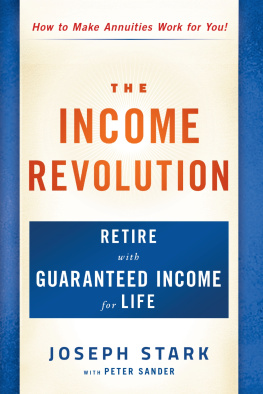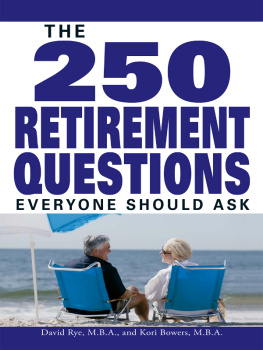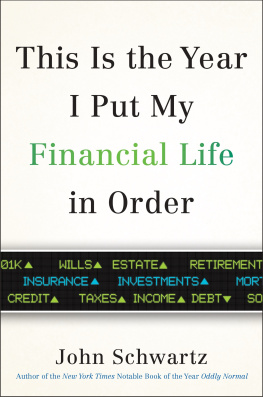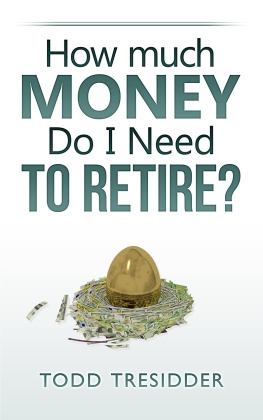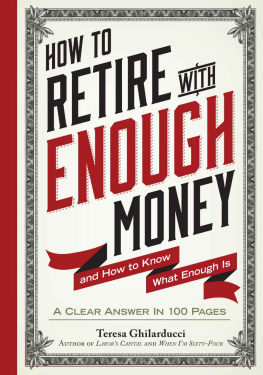Table of Contents
RESCUING RETIREMENT
RESCUING RETIREMENT
A PLAN TO GUARANTEE RETIREMENT SECURITY FOR ALL AMERICANS
TERESA GHILARDUCCI AND TONY JAMES
FOREWORD BY TIMOTHY GEITHNER
COLUMBIA UNIVERSITY PRESS | NEW YORK
Columbia University Press
Publishers Since 1893
New York Chichester, West Sussex
cup.columbia.edu
Copyright 2018 Teresa Ghilarducci and Hamilton E. James
All rights reserved
E-ISBN 978-0-231-54627-0
Library of Congress Cataloging-in-Publication Data
Names: Ghilarducci, Teresa, author. | James, Tony, 1951- author.
Title: Rescuing retirement: a plan to guarantee retirement security for all Americans / Teresa Ghilarducci and Tony James.
Description: 1 Edition. | New York : Columbia University Press, [2018] | Includes bibliographical references and index.
Identifiers: LCCN 2017035932 (print) | LCCN 2017037759 (ebook) | ISBN 9780231546270 | ISBN 9780231185646 (alk. paper)
Subjects: LCSH: Retirement incomeUnited StatesPlanning. | RetirementUnited StatesPlanning.
Classification: LCC HG179 (ebook) | LCC HG179 .G4734 2018 (print) | DDC 332.024/01450973dc23
LC record available at https://lccn.loc.gov/2017035932
A Columbia University Press E-book.
CUP would be pleased to hear about your reading experience with this e-book at .
Cover design: Lydia Fine
Cover photograph: Peter Dazeley GettyImages
To our mothers, Waleska James and Marion Ghilarducci, for their support for us and their generosity of spirit toward the world at large.
To the next generation, especially Joseph Ghilarducci ORourke and Genevieve McGahey, and Meredith, Becky, and Ham James.
And to all the retirees of tomorrow, who are entitled to retire with dignity.
Our plan would guarantee millions of Americans safe and secure retirements that would benefit them, their families, and the nations economy.
Teresa Ghilarducci and Hamilton E. James. A Smarter Plan to Make Retirement Savings Last, New York Times, January 1, 2016
CONTENTS
TIMOTHY GEITHNER
T he United States faces a discouraging mix of long-term economic challenges and the diminished capacity of the political system to deliver a framework of incentives and investments that can address these challenges.
Among these challenges, the lack of retirement security is one of the most daunting. As Teresa Ghilarducci and Tony James write, this is a problem for the vast majority of working Americans. It wont go away on its own. Without a substantial change in individual savings and investing behavior, we face a future with tens of millions of elderly poor.
Americans typically save a relatively small portion of their income. The savings rate moved a bit higher after the trauma of the financial crisis of 2008, but it remains low. A large majority of Americans do not have a financial cushion adequate to cover their immediate needs, much less their needs in the decades they will live after they retire.
Neither the behavior of individuals nor economic policy has adapted to a world in which people are living longer, health care costs are expensive and rising, median income growth is slower, and expected returns on financial assets are lower. With the end of an employer-based defined-contribution system and with changes in the health care system, we have shifted a lot of economic risk to the individual, but individuals are having a hard time adapting to that new reality.
Many other economies have enacted fundamental reforms of their pension systems, but our system remains burdened by some fundamental shortcomings. We have an elaborate set of expensive tax preferences that appear to have little effect on encouraging savings and whose benefits go disproportionately to the relatively fortunate. The savings products that have succeeded the defined-benefit plans of the past are designed in ways that enable the worst instincts of individual investors, without giving them access to the investment models that allow them to gain some of the benefits of a long-term investment horizon.
Unsustainable long-term deficits mean that individuals have to contemplate a future with higher taxes and lower benefits. Individuals will have to pay more for retirement and more for health care during retirement. The longer-term constraints on our fiscal resources mean we have to be careful how we allocate those benefits today, including through the tax code and its provisions designed to encourage savings.
Teresa Ghilarducci and Tony James make a powerful case for reform, and they have designed a system better than what we have today that would complement, not substitute for, Social Security. Their proposal combines the best features of the reforms adopted in other countries, without adding an unrealistic and unaffordable commitment of future tax resources. They approach the challenge without ideological bias, guided by a refreshingly pragmatic focus on what the evidence suggests is likely to work.
F irst and foremost, we thank Will Pollock for his invaluable research, writing, and editing throughout this process. We also thank Christine Anderson and Peter Rose for their enthusiastic support and encouragement. Pete Peterson is an inspiration who proves that a lone voice can make a difference, and that business leaders bear an obligation to help solve societys problems. Neera Tanden got this all started by asking us to do a policy speech in Washington, D.C. around a new big idea.
Jeffrey Nussbaum, Michael Flynn, and Adam Talbot lent their policy expertise and formidable writing skills to refine the plan. Teresas New School colleagues, Rick McGahey, Will Milberg, David VanZandt, Bridget Fisher, and Tony Webb, are admirably determined and committed to advance a constructive national plan for retirement security. Bridget was indispensable in communicating this books ideas to the media and to stakeholders, and Tony lent his expertise as an economist to confirm many of our numbers.
Throughout this process, we have been fortunate to meet and speak with leading economistsincluding Erskine Bowles, Austan Goolsbee, Glenn Hubbard, Alan Krueger, Alicia Munnell, Larry Summers, Timothy Geithner, and Robert Rubinand with elected officials from across the political spectrum. Republicans and Democrats alike have expressed determination to find common ground to solve the retirement crisis. We are profoundly grateful for their commitment to this cause.
We also want to recognize the countless Americans struggling to do the right thing in a broken system: employers who do all they can to provide retirement savings support for their staff, and employees who work more hours per week, more weeks per year, and more years per lifetime than workers in most wealthy nations. These dedicated men and women deserve a better retirement system, one in which their money works as hard as they do to secure their standard of living for the full span of their lives.
M y retirement plan, Robert Hiltonsmith told PBSs Frontline, is fingers crossed and pray, basically. Yeah, win the lottery. The truth is, [Im] just going to have to find a way to save way more than you should have to.
An economist in his mid-thirties, Roberts plight captures much of what is wrong with the U.S. retirement system. Given his promising career and relative youth, he should have all the tools he needs to plan for a comfortable retirement. But his outlook could not be more pessimisticor revealing.


